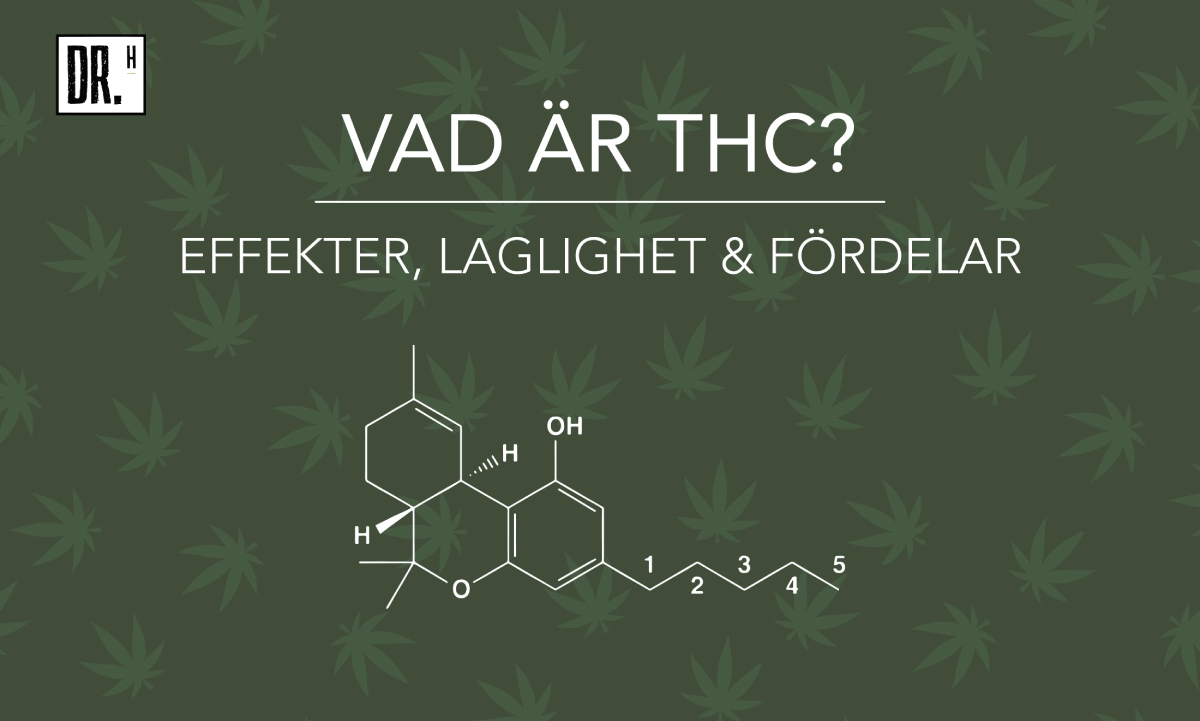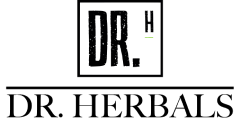
On this page you will find information about:
THC is one of the most studied and talked about cannabinoids found in the cannabis plant. Its unique properties have sparked great curiosity and debate. Let's explore what THC is, where it is legal and how it affects the human body.
What is THC and how does it work?
THC, or delta-9-tetrahydrocannabinol, is the primary psychoactive component of the cannabis plant and is responsible for its characteristic 'high' or euphoric effect. By potentially interacting with the body's endocannabinoid system, THC binds to cannabinoid receptors, eliciting various physiological and psychological effects.
What makes THC different from other cannabinoids?
The main difference between THC and other cannabinoids, such as CBD, is that THC is illegal in most countries, including Sweden, Norway, Finland and several other countries. On the other hand, CBD is fully legal in most EU countries. Although THC shares some similarities with other cannabinoids, such as CBD and THCB, it possesses its own unique properties. Unlike CBD, which lacks psychoactivity, THC generates a significant psychoactive effect.
How does it affect the body?
Scientists claim that THC affects the body by binding to cannabinoid receptors found in the brain and other parts of the body. By activating these receptors, THC can potentially affect various functions, including mood, appetite, memory and coordination.
Are there legal alternatives to THC?
Yes, today there are legal alternatives to THC in Sweden. These include THCB and THCV. These alternative cannabinoids produce a similar effect to THC.
They are legal to buy and use in the UK and in most European countries. It is recommended to always buy from reliable sources to ensure a pure and safe product. However, you are not allowed to use cannabinoids as food or medicine. Our products are sold for aromatic and decorative use only.

THC drug test
How long does THC stay in the system?
How long THC stays in the body depends on a range of factors such as individual biological differences and patterns of use. To begin with, THC can be detected in the blood for a short period of time, usually up to a few days after ingestion. In the urine, THC can be detected for a longer period of time, up to several weeks, especially in people who use cannabis regularly or in large amounts.
One of the reasons why THC can be detected for longer periods in urine is that it is broken down into different metabolites that are stored in the adipose tissue and excreted slowly over time. Body fat percentage therefore plays a role in how long THC can be detected, with higher body fat percentages potentially prolonging the time it takes to eliminate THC from the body.
The metabolism of the individual is also an important factor. A faster metabolism may help to break down and eliminate THC and its metabolites more quickly than in people with a slower metabolism.
How can you test positive for THC?
THC can be detected through various drug tests, including urine, blood and hair tests. If a person has consumed THC, it can be detected in the body's various fluids and tissues for some time after consumption.
Overdose and risks of THC
Can you overdose?
Yes, like other substances such as water and food, it is possible to experience an overdose of THC. Overconsumption of THC, especially when ingesting significant amounts over a short period of time, can result in unpleasant side effects such as anxiety, paranoia, increased heart rate and confusion. It is worth noting that these side effects rarely pose a danger to life. The duration of symptoms can vary from a few hours to several days depending on individual factors.
What are the risks?
Although THC can offer many potential benefits according to some studies and in medicines, there are risks and unwanted side effects associated with excessive use. These include anxiety, paranoia, memory disorders and cognitive impairment. In addition, some individuals may develop dependence and addiction to THC. There are no life-threatening risks with THC. In countries where THC is legal, it is of utmost importance to buy from trusted sources to avoid products containing other potentially harmful chemicals.
Antidote "antidote" to THC
CBD (cannabidiol) is not considered an antidote to THC (tetrahydrocannabinol) in the strict medical sense, but there are research suggesting that CBD may mitigate some of the negative effects of THC. Here are some key points:
- Reduction of psychoactive effectsSome studies claim that CBD can counteract some of the psychoactive effects of THC, such as anxiety and paranoia. This is because CBD can potentially modulate how THC affects cannabinoid receptors in the brain.
- Balance of cannabinoids: Many commercial cannabis products contain both THC and CBD, as the balance between these two cannabinoids can provide a more controlled and gentle experience for the user.
- Interaction with receptorsCBD potentially affects the CB1 receptors in the brain in a way that can reduce the intense psychoactive effects of THC. This means that if a person experiences unpleasant effects from THC, consuming CBD can help reduce these effects.
Note that CBD and THC are not legal to use as food in Sweden. You can buy CBD legally in Sweden, if the product is free from THC. It is not legal to buy or possess THC in Sweden.
Legality of THC
Is THC legal in Sweden?
In Sweden, THC is illegal for general use. The only legal route for THC consumption is through medical prescriptions from the healthcare system.
Where is THC legal?
The legality of THC varies from country to country, and can also change over time due to changes in laws and political climates. In some countries, THC is completely illegal, while in other countries it may be legal for medicinal use, recreational use, or both.
Examples of countries where THC is legal for medical use includes:
- Canada
- Some states in the USA
- Spain
- Italy
- Germany
- Austria, Austria
- The Netherlands
- Croatia
- Portugal
In the case of recreational use it is legal in countries like:
- Canada
- Uruguay
- Some US states, such as Colorado and California.
Is THC legal in the Netherlands?
In Amsterdam, and in the Netherlands as a whole, there is a tolerant policy towards cannabis. Although THC in the form of cannabis products is technically illegal under Dutch law, in practice it is allowed under certain conditions.
In Amsterdam and other parts of the Netherlands, there are specific 'coffeeshops' where the sale and consumption of cannabis products is allowed under certain restrictions and with a license. THC is thus available to adults in Amsterdam, but this takes place within a regulated and controlled environment. However, visitors should be aware that Dutch laws and policies are subject to change, so it is always best to check the latest information when planning a trip.
Is THC legal in Spain?
In Spain, THC is not legal for recreational use. However, Spain has a more tolerant attitude towards cannabis than some other countries.
Spain allows the use and cultivation of cannabis for personal use in private homes. In addition, some regions of Spain, such as Catalonia and the Basque Country, have passed laws allowing the establishment of cannabis social clubs where members can grow and share cannabis for personal use within the confines of the club.
Is THC legal in Portugal?
In Portugal, legislation on THC and cannabis is quite liberal compared to many other countries.
In 2001, Portugal decriminalized the use and possession of all drugs for personal use, including cannabis and THC. This means that people who possess small amounts of drugs for personal use are not punished with imprisonment, but instead can receive counseling, treatment or other measures to reduce their abuse.
However, it is important to note that although possession for personal use has been decriminalized, the sale, cultivation and distribution of cannabis is still illegal in Portugal. Thus, THC is not legal for recreational use or sale, but there is a liberal approach to personal use for adults.
Medicinal Cannabis
SVT News: More and more Swedes get medical cannabis on prescription
During 2021 the number of patients prescribed the cannabis-based drug increased by almost 60 percent, according to SVT News.
It was prescribed to 650 patients, an increase from 2020 when 415 people collected cannabis from pharmacies.What does the research say?
Research is extensive and still ongoing. Studies has shown that THC may have potential therapeutic benefits. However, more research is needed.
Effects
What to expect when using THC products?
THC products are available in various forms, including flowers, edibles, oils and ointments. The effects of THC vary depending on several factors, such as amount, method of administration and individual tolerance.
How strong is THC?
From a chemical perspective, THC is a cannabinoid that has a side chain consisting of five carbon atoms. This chemical structure gives THC its potent properties. Having five carbon atoms in the side chain is one of the factors that contribute to THC's strong impact on the body when used.
Frequently asked questions about THC
Is THC natural?
Yes, THC is a naturally occurring compound found in the cannabis plant. It is one of the many cannabinoids found in the plant and plays a role in its natural biochemistry.
Why is THC found in Cannabis plants?
Its presence and function in the plant has evolutionary and biological explanations. THC acts as a defense system for the plant against pests and certain pathogens.
Biologically, THC is part of the chemical composition of the plant to protect it from predators and to encourage certain animals to disperse its seeds, which is a strategy for the survival and spread of the plant.
Can I use THC with other medicines?
No, THC can interact with some medicines, which may affect their effectiveness or increase the risk of side effects.
